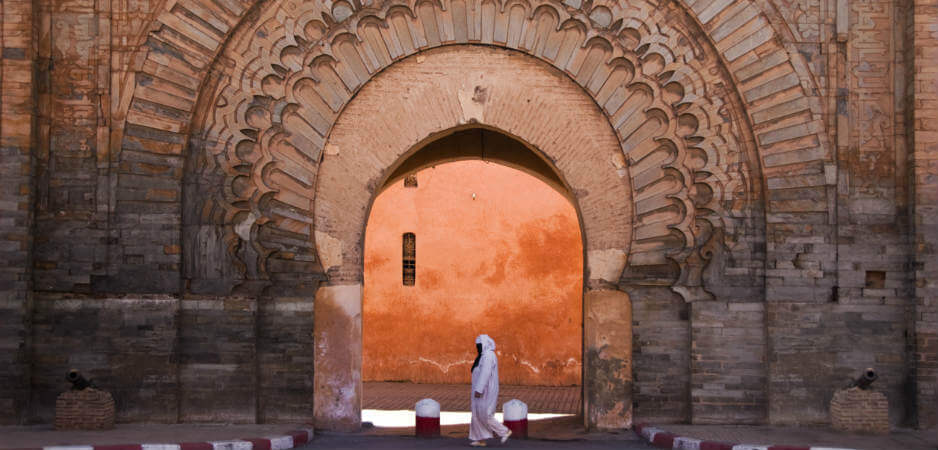The recent ban on in-flight electronics can be construed as a deliberate step to discourage Muslims from traveling to the US.
On February 8, 2017, my wife and I arrived in Casablanca, Morocco. Just like outside many international airports around the world, we were greeted with hand-made signs in various languages, awaiting families and eager friends. A cool wind and relative calm stood in stark contrast to the chaos of the nearby metropolis—throughout Morocco, Casablanca is known for its traffic and constant bustle.
Over the next week we traveled the diverse country, having mint tea in homes, crossing snowy mountains, sleeping among the dunes of the Sahara, getting lost in the labyrinthine interiors of royal cities and meeting the residents of countless small kasbahs and villages of the Moroccan interior.
Along this journey, we were greeted with unfailing hospitality. Once we were met with an emotional outpour, as we were the first Americans one rural Moroccan has seen in a generation. The experience had a touch of grey, however, being less than two weeks removed from President Donald Trump’s Executive Order 13769—the “Muslim Ban”—which halted the arrival of non-US citizens from seven enumerated Muslim-majority countries, making specific exceptions for non-Muslims. Politics was on the mind of many of our hosts and acquaintances.
Most Moroccans shared concern or dismay with recent US political developments. While Morocco was not specifically targeted by President Trump’s ban, there was little reason to view the United States as a tolerant place for Muslims. The basic unfairness of such a broadly applicable policy was at the heart of the dissent. A Bedouin camel herder provided a persuasive assessment of the ban as affecting too many innocent people, all while holding up seven fingers and shaking his head.
In the Past Tense
After the president’s first executive order was repeatedly challenged in court, the administration released a replacement action that similarly claimed to only be aimed at preserving US national security. That too was struct down by a court, relying upon the same evidence many Moroccans did: the hateful and xenophobic rhetoric of the president and those close to him.
Indeed, while many Moroccans expressed interest in and even admiration of the United States, those feelings often occurred in the past tense, either grammatically or emotionally. Countries like France, Germany and China prove more attractive for education, business and trade, respectively. Indeed, Chinese tourists were ubiquitous throughout the entire country. One friend said he may only consider visiting the United States after Trump and his policies have come to pass.
A common concern heard in our travels of the North African country was whether Morocco would be next to be added to the list. The most recent travel action by Trump to ban the use of electronics larger than a smartphone on US-bound flights from airports across the Middle East, which includes Mohammed V International Airport where we landed, will surely feel to many as if their concerns have now materialized.
Like the original Muslim ban, the official justification for this newest restriction is national security. But, unlike the immigration ban, the real underlying reason is likely economic retaliation against the government-subsidized airlines that operate in the region.
Regardless of stated or unstated motives, this recent action serves to limit the options and agency of travelers of the 10 airports spanning eight countries, all of which are majority Muslim. Combined with the seven countries named in the original ban, this administration has now directly targeted, within two months of taking office, travelers from 15 Muslim nations, crossing language and ethnic divides. These actions can only be reasonably construed as deliberate steps to discourage and limit the travel of Muslims to the United States, likely with further measures to follow.
Keeping Our Promise
Before the Trump administration took office, Morocco would take great pride in its history as the first country to recognize US independence in 1777, then referred to by Europeans as part of the Barbary Coast. Twenty years after that recognition, the United States signed a series of treaties with North African leaders, including Morocco, known as the Barbary Treaties. The first of those treaties stated, in part:
As the government of the United States of America is not in any sense founded on the Christian Religion,—as it has in itself no character of enmity against the laws, religion or tranquility of Musselmen,—and as the said States never have entered into any war or act of hostility against any Mehomitan nation, it is declared by the parties that no pretext arising from religious opinions shall ever produce an interruption of the harmony existing between the two countries.
The text of this treaty, like any ratified document, was passed by Congress and enshrined into law by the president, which occurred under John Adams only ten years after the ratification of the US Constitution itself. The actions of the Trump administration to pit the United States in direct conflict with Islam are not only counter to the statements of his presidential predecessors Barack Obama and George W. Bush, but also contravenes the intentions of nation’s founders such as Thomas Jefferson.
It is my hope, which is shared by millions in this country and the Muslim world, that the United States can honor the promise of our Founding Fathers that we have no enmity against Islam or Muslim nations.
I hope that Americans continue to resist the president’s actions on behalf of our Muslim friends and family, citizens and visitors alike. And I hope we can finally put in to practice the tale we tell our children—that America accepts anyone who plays by the rules and works hard.
Only then will my Moroccan friends or my Iraqi family feel safe to visit loved ones and experience the natural and cultural beauty of America, which can still capture the imagination of people around the world, regardless of their religious convictions.
The views expressed in this article are the author’s own and do not necessarily reflect Fair Observer’s editorial policy.
Photo Credit: FrankvandenBergh
Support Fair Observer
We rely on your support for our independence, diversity and quality.
For more than 10 years, Fair Observer has been free, fair and independent. No billionaire owns us, no advertisers control us. We are a reader-supported nonprofit. Unlike many other publications, we keep our content free for readers regardless of where they live or whether they can afford to pay. We have no paywalls and no ads.
In the post-truth era of fake news, echo chambers and filter bubbles, we publish a plurality of perspectives from around the world. Anyone can publish with us, but everyone goes through a rigorous editorial process. So, you get fact-checked, well-reasoned content instead of noise.
We publish 2,500+ voices from 90+ countries. We also conduct education and training programs
on subjects ranging from digital media and journalism to writing and critical thinking. This
doesn’t come cheap. Servers, editors, trainers and web developers cost
money.
Please consider supporting us on a regular basis as a recurring donor or a
sustaining member.
Will you support FO’s journalism?
We rely on your support for our independence, diversity and quality.







